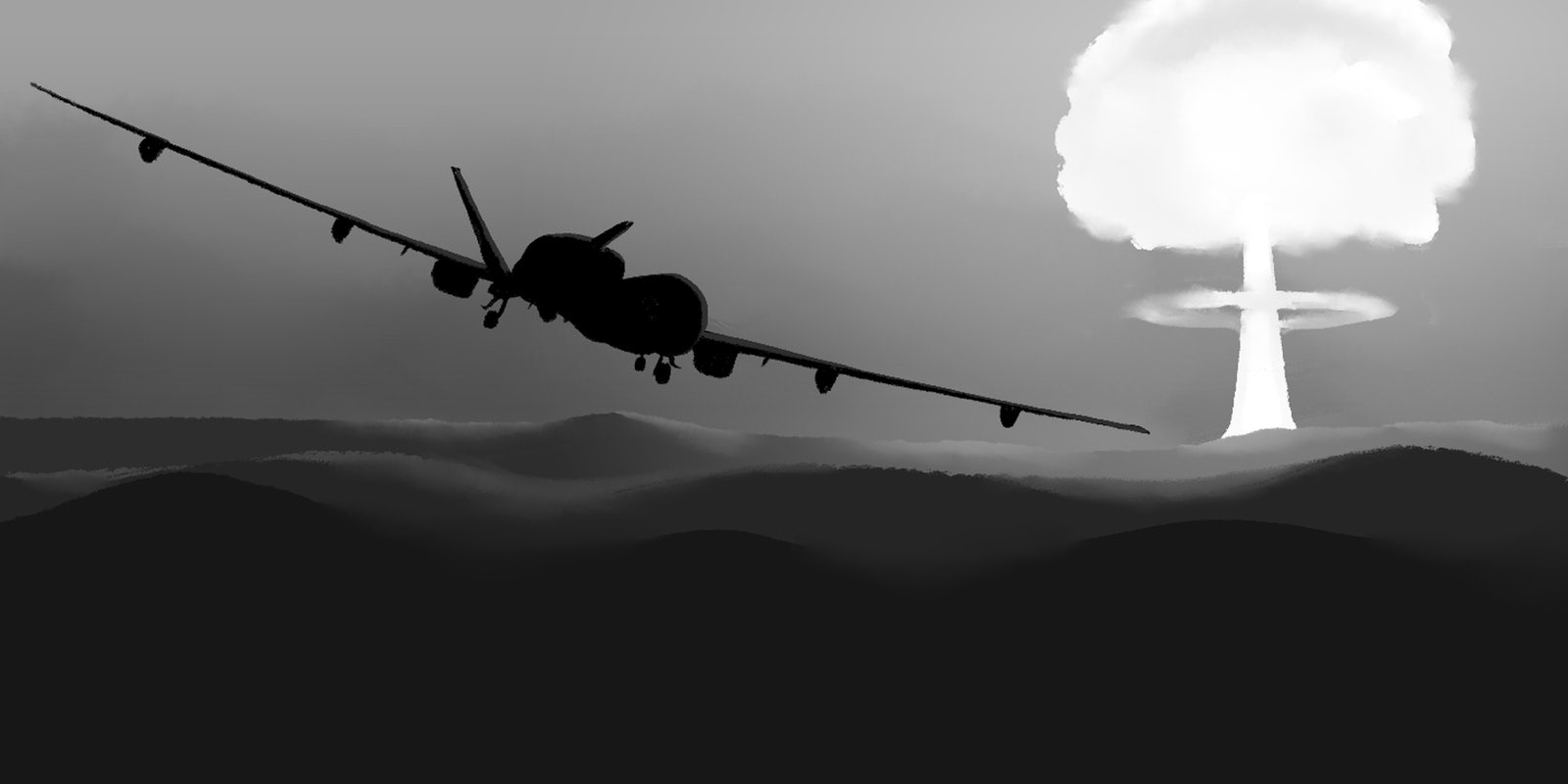Four former members of the United States Air Force, each involved with the controversial drone anti-terrorism program, offered telling details about their reasons for opposing the program at an event on Thursday.
“It gets to you,” Senior Airman Stephen Lewis said in downtown Manhattan, in an event organized by Fitzgibbon Media, a communications firm whose clients include WikiLeaks, for the upcoming documentary Drone.
“I didn’t know who he was,” said 29-year-old Lewis, who served in the Air Force’s 3rd Special Operations Squadron, reflecting on one wounded person he was ordered to kill. “I didn’t know if he had anything to do with it.” Lewis said he asked superiors for details, but they refused to answer his request to confirm the person was an enemy combatant.
“There are 15-year-olds today who haven’t lived a day without war, without drones flying ahead.”
“There are 15-year-olds today who haven’t lived a day without war, without drones flying ahead,” Senior Airman Cian Wesmoreland, a communications technician who had been based in Germany and Kandahar, Afghanistan, said.
The U.S.’s drone program has come under severely increased scrutiny in recent weeks. The Intercept recently found, via leaked documents, that in a recent five-month period, nine out of 10 people killed by a U.S. drone strike weren’t the intended targets. Retired Lt. General Michael Flynn, the White House’s former top military intelligence official, who oversaw the drone program’s expansion into Somalia and Yemen, recently told Al Jazeera, “When you drop a bomb from a drone … you are going to cause more damage than you are going to cause good.”
Senior Airman Michael Haas, who trained drone new operators, lamented the program’s culture. He said that in his shift alone, roughly six people, himself included, were often impaired by drugs, including bath salts. Though some trainees shared his desire to prioritize innocent and American lives over killing possible combatants, others had trouble recognizing “this wasn’t a video game,” he said. When he took one trainee off of a mission for his apparent “bloodlust,” he said, he was summoned to explain his actions, then wasn’t allowed to instruct for “approximately ten days.”
Westmoreland, clearly shaken by his post-service report that he said revealed he’d been responsible for over 200 enemy kills, stressed that the intelligence used to determine who to kill with the program was often shaky at best, relying on either informants who lie for a monetary reward or based on signals intelligence, like a phone’s SIM card, which are widely traded on black markets.
“You can end up targeting somebody who’s totally innocent,” he said. “It’s usually confirmed as an enemy kill.”
After reading a U.N. report that indicated how many civilians were killed by airstrikes, Westmoreland considered suicide, he said.
Staff Sergeant Brandon Bryant, who served in two squadrons with Haas, said he was assigned in early 2011 to help hunt down Anwar al-Awlaki, the American-Yemeni hate preacher who was controversially killed by an ordered U.S. drone strike, lamented that he was asked to break his sworn oath to the Constitution. “[We were] told this man was a traitor to the U.S. and that he deserved to die,” he said. He added that the claims caused “discontent” within his squadron.
All four men described tales of post-traumatic stress syndrome and incredible difficulty getting veteran’s benefits and reintegrating society. “I’ve had people who I flew with … tell me that they would kill me,” Bryant said.
In a letter to President Barack Obama, Defense Secretary Ashton Carter, and CIA Director John Brennan, the four men imply that the U.S. drone program encourages terrorism like the deadly attacks in Paris on Nov. 13 that claimed the lives of at least 129 people.
“We cannot sit silently by and witness tragedies like the attacks in Paris,” they wrote, “knowing the devastating effects the drone program has overseas and at home.”
Update 10:05am CT, Nov. 20: In a statement to emailed to the Daily Dot, Air Force Lt. Col. Chris Karns defended the U.S. drone program as “critically important” to national and global security, while also recognizing that the demands on airmen involved in the program are “tremendous.”
“Our remotely piloted aircraft operators perform a critically important mission that contributes significantly to national defense and global security. They are professional and comply with applicable law, policies, and adhere to very exacting procedures.
“Airmen are expected to adhere to established standards of behavior. Behavior found to be inconsistent with Air Force core values is appropriately looked into and if warranted, disciplinary action is taken.
“No doubt, the demands placed on the RPA force are tremendous. A great deal of effort is being taken to bring about relief, stabilize the force, and sustain a vital warfighter capability. RPA capabilities fulfill critical demands across the globe and the need for this capability will always exist.
“This mission demands highly-trained professionals as the capability and the Airman responsible for this mission are vital to the national security of the United States and our Allies. We have talented and dedicated Airmen conducting this mission.”
The White House would not comment on the soldiers’ claims.
Illustration by Max Fleishman


